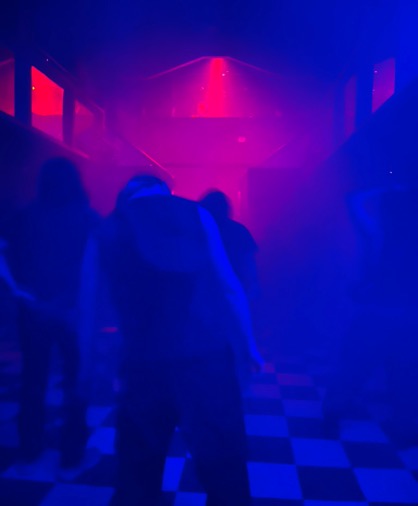
As a ERI/PS2 fellow, I conducted an experiential affective autoethnography of queer rave spaces in New York City. When I hear people describe an event as fun I often wonder: What is fun for you? Was the whole experience fun? How did you know you were having fun? While words have an important social purpose to communicate a shared understanding of an experience, they often miss the felt experience—the movements, sensations, irritations, mood shifts (affects). My research aimed to approximate experience as closely as possible, driven by the belief that these felt affects are the key organizers of the self, social experience, and social (even political) affiliation.
This project focused on connecting with these unspoken aspects of experience, exploring how rave spaces facilitate non-verbal, affective resonance. My inquiry was aimed at describing the affects in the rave space that allow the body to briefly step outside of the confines of the performance of societal labels, such as womanhood or heterosexuality. In this way, my aim was to search for experiences that felt liberating, that felt good.
A theme that emerged in my work is the resurfacing of affective memories, not through the act of remembering or revisiting a physical place, but through movement. For instance, while dancing with my shoulders relaxed, head held high, and swaying side to side, a visual image of a house I lived in at age 12 suddenly appeared in my mind. There were no words, just a feeling of being powerful —like strutting down a runway. I haven’t felt this way in years but somehow it felt like the feeling was always there, swimming amid my body’s footprints, as if it had always been within reach. This affective node of experience reemerged through movement, transcending temporality and spatiality.
Another crucial theme was the experience of the body as briefly autonomous from the mind. After repeated dance movements, a flow state emerged that allowed my body to move without the mind’s permission. This experience allowed me to tap into an energetic intuition that seemed to run faster than the mind’s judgment of the movement. Some of the movements were funny, like moving my hands as if drying them off, but they all felt good, as if they were all required.
The present project reveals queer rave spaces as potential spaces to experience affects that draw us closer to the body. Specifically, the rave space might be a fertile ground for discovering and embracing the body’s intuitive rhythms and sensations.
Author

Natalia Lara
PS2 Public Research Fellow
NataliaLara is an international doctoral student from Mexico in the Critical Social Psychology Program. Their research focuses on affect theory, ethnography, body studies, decolonial methods, consciousness, and phenomenology. Natalie is particularly interested in how affect (emotion) travels within and between bodies.
